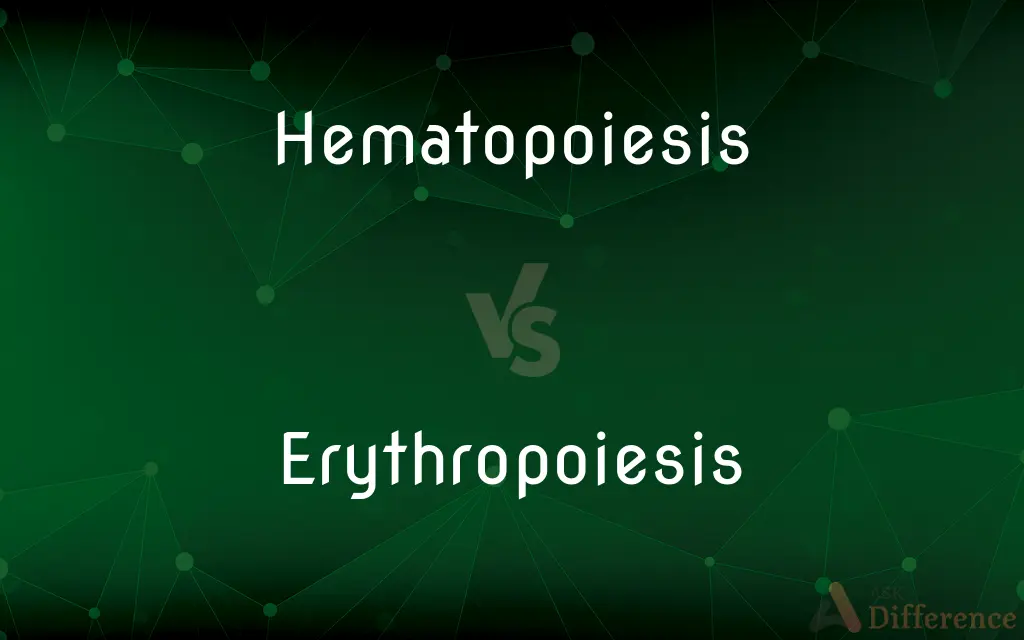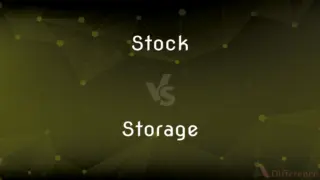Hematopoiesis vs. Erythropoiesis — What's the Difference?
By Fiza Rafique & Urooj Arif — Updated on March 21, 2024
Hematopoiesis is the process of blood cell formation, including all types, while erythropoiesis specifically refers to the production of red blood cells.

Difference Between Hematopoiesis and Erythropoiesis
Table of Contents
ADVERTISEMENT
Key Differences
Hematopoiesis is the complex process of blood cell formation, generating red blood cells, white blood cells, and platelets from multipotent hematopoietic stem cells found primarily in the bone marrow. Erythropoiesis, a subset of hematopoiesis, specifically focuses on the production of red blood cells (erythrocytes), which are crucial for transporting oxygen throughout the body.
The regulation of hematopoiesis involves a variety of growth factors and cytokines that ensure a balanced production of different blood cell types according to the body's needs. Erythropoiesis is tightly regulated by erythropoietin (EPO), a hormone primarily produced by the kidneys in response to low oxygen levels in tissues, to increase red blood cell production.
Hematopoiesis occurs in the bone marrow, where stem cells differentiate into various types of blood cells. Erythropoiesis also takes place in the bone marrow, starting from a specific type of hematopoietic stem cell that commits to becoming a red blood cell through several stages of development, maturation, and eventual release into the bloodstream.
While hematopoiesis includes the production of myeloid cells (such as erythrocytes, leukocytes, and platelets) and lymphoid cells (such as T cells and B cells), erythropoiesis is solely concerned with the development of erythrocytes. This specialization is crucial for maintaining adequate oxygen delivery to meet physiological demands.
Understanding both processes is essential for diagnosing and treating various hematological conditions, such as anemias, leukemias, and clotting disorders. Erythropoiesis can be specifically targeted in treatments for anemias, using agents like synthetic EPO to stimulate red blood cell production.
ADVERTISEMENT
Comparison Chart
Definition
Production of all types of blood cells.
Production of red blood cells only.
Regulating Factors
Various growth factors and cytokines.
Primarily erythropoietin (EPO).
Location
Bone marrow and other hematopoietic organs.
Bone marrow.
Cell Types Produced
Red blood cells, white blood cells, platelets.
Red blood cells (erythrocytes).
Significance
Ensures a balanced production of blood cell types.
Crucial for oxygen transport in the body.
Compare with Definitions
Hematopoiesis
Involves Multiple Lineages.
Hematopoiesis leads to the formation of myeloid and lymphoid lineages.
Erythropoiesis
Red Blood Cell Production.
Erythropoiesis is responsible for maintaining the red blood cell count.
Hematopoiesis
Regulated by Growth Factors.
Stem cell factor (SCF) plays a key role in hematopoiesis.
Erythropoiesis
Critical for Oxygen Delivery.
The primary function of erythrocytes produced during erythropoiesis is to transport oxygen.
Hematopoiesis
Occurs in Bone Marrow.
Adult hematopoiesis predominantly takes place in the bone marrow.
Erythropoiesis
Target for Anemia Treatment.
Synthetic erythropoietin is used to treat certain types of anemia by boosting erythropoiesis.
Hematopoiesis
Essential for Immunity.
The production of white blood cells is a critical aspect of hematopoiesis for immune defense.
Erythropoiesis
Series of Maturation Stages.
Erythropoiesis involves the development of erythroblasts to mature red blood cells.
Hematopoiesis
The formation of the cellular elements of the blood, including the red blood cells, white blood cells, and platelets, which in adult mammals takes place chiefly in the bone marrow.
Erythropoiesis
Regulated by Erythropoietin.
Low oxygen levels in tissues trigger the release of EPO, stimulating erythropoiesis.
Hematopoiesis
The process by which blood cells are produced.
Erythropoiesis
Erythropoiesis (from Greek 'erythro' meaning "red" and 'poiesis' "to make") is the process which produces red blood cells (erythrocytes), which is the development from erythropoietic stem cell for mature red blood cell.It is stimulated by decreased O2 in circulation, which is detected by the kidneys, which then secrete the hormone erythropoietin. This hormone stimulates proliferation and differentiation of red cell precursors, which activates increased erythropoiesis in the hemopoietic tissues, ultimately producing red blood cells (erythrocytes).
Hematopoiesis
The formation of blood cells in the living body (especially in the bone marrow)
Erythropoiesis
The production of red blood cells.
Erythropoiesis
The production of red blood cells (in bone marrow)
Erythropoiesis
The process of producing red blood cells by the stem cells in the bone marrow
Common Curiosities
What is erythropoiesis?
Erythropoiesis is the specific process of red blood cell production, a subset of hematopoiesis.
How is hematopoiesis regulated?
Hematopoiesis is regulated by a variety of growth factors and cytokines that ensure balanced blood cell production.
What triggers erythropoiesis?
Erythropoiesis is primarily triggered by erythropoietin (EPO), which is produced in response to low oxygen levels.
Can erythropoiesis be artificially stimulated?
Yes, erythropoiesis can be stimulated using synthetic erythropoietin, commonly used in the treatment of some anemias.
What types of cells are produced during hematopoiesis?
Hematopoiesis produces red blood cells, white blood cells, and platelets.
How does the body know when to produce more red blood cells?
The body senses low oxygen levels in tissues, prompting the kidneys to release EPO, which stimulates erythropoiesis.
Why is erythropoiesis important?
Erythropoiesis is crucial for producing red blood cells that transport oxygen to tissues throughout the body.
Where does hematopoiesis occur?
Hematopoiesis mainly occurs in the bone marrow, with some processes also taking place in other hematopoietic organs.
How do diseases affect hematopoiesis?
Diseases can disrupt the balance of hematopoiesis, leading to conditions like anemia, leukopenia, or thrombocytopenia.
What is hematopoiesis?
Hematopoiesis is the process by which all blood cells are formed from stem cells in the bone marrow.
What is the role of the spleen in erythropoiesis?
The spleen primarily acts as a filter for blood and does not significantly contribute to erythropoiesis under normal conditions.
What happens to old or damaged red blood cells?
They are typically removed from circulation and broken down by the spleen and liver, with their components recycled.
What is the difference between myeloid and lymphoid lineages?
Myeloid lineage includes red blood cells, platelets, and some white blood cells, while lymphoid lineage produces T cells and B cells, key components of the immune system.
Can hematopoiesis occur outside the bone marrow?
In certain conditions, extramedullary hematopoiesis can occur in organs like the spleen and liver.
Are all blood cells produced at the same rate?
No, the production rates of different blood cells are regulated according to the body's needs.
Share Your Discovery

Previous Comparison
Stock vs. Storage
Next Comparison
Shade vs. GhostAuthor Spotlight
Written by
Fiza RafiqueFiza Rafique is a skilled content writer at AskDifference.com, where she meticulously refines and enhances written pieces. Drawing from her vast editorial expertise, Fiza ensures clarity, accuracy, and precision in every article. Passionate about language, she continually seeks to elevate the quality of content for readers worldwide.
Co-written by
Urooj ArifUrooj is a skilled content writer at Ask Difference, known for her exceptional ability to simplify complex topics into engaging and informative content. With a passion for research and a flair for clear, concise writing, she consistently delivers articles that resonate with our diverse audience.














































